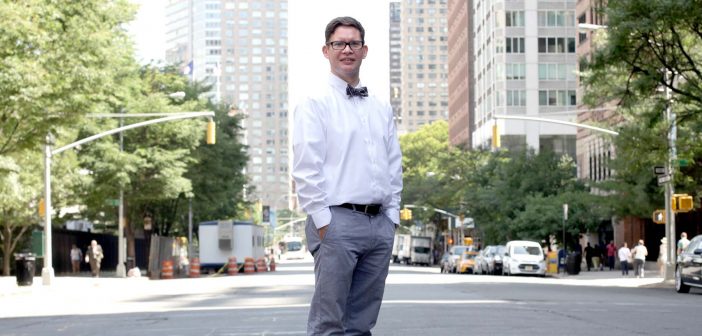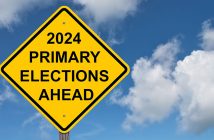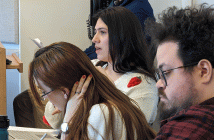Sitting on Fordham’s Robert Moses Plaza, Gregory Acevedo, PhD, associate professor in the Graduate School of Social Service, noted that the film West Side Story was filmed on the site where the University now sits.
Over the Fourth of July weekend, Acevedo watched the film between news coverage of the financial crises unfolding in Greece and Puerto Rico. When the characters in the film referred to Puerto Ricans as “immigrants,” he said it reminded him of how little has changed since the Jets fought the Sharks.
“The current Puerto Rican fiscal crisis shows just how the U.S. population still has no idea about the island’s history or its political status,” said Acevedo, whose mother and father hail from the U.S. territory. “It has taken the current crisis to heighten awareness.”
Like in the film, he said, many U.S. citizens still think of Puerto Ricans as foreigners even though the island has been part of the United States for more than a century: Puerto Ricans could never be U.S. “immigrants” because they’re already here.
As such, while the Greek $315 billion debt crisis could very well affect many U.S. citizens, the current crisis in Puerto Rico already has: the commonwealth is $72 billion in debt. And just as the economic hardships forced working class Puerto Ricans to emigrate stateside during the 1950s, so too has the current crisis sent middle class professionals fleeing for the states.
Island Brain Drain
There has been debate as to whether this recent migration of the professional class has reached the level of a “brain drain.” Acevedo noted that reports by the New York Federal Reserve and the Center for Puerto Rican Studies say otherwise, but those reports were released before the debt crisis hit its crescendo in the last 18 months.
“There is no question that the number of college-educated island residents has been reduced,” he said.
Historically, the population shift from the island to the U.S. mainland, which began in the 1950s in waves, is now the one of the largest anywhere in the world in terms of scale and proportion, he said. The tipping point was in the 2000s, but the current crisis will likely exacerbate the situation.
“There are [now]more Puerto Ricans living stateside than on the island. That’s pretty epic,” he said. “Rarely do you get a population that has exported more than it has maintained—the Irish immigration would be the closest comparison.”
Circular Migration
For Puerto Ricans, the dynamics of “moving within and between” has created a rather unique migration pattern.
Whether it’s the heroin epidemic that has been recycled across several decades since the 1960s or the crack-cocaine epidemic in the 1980s, festering social problems that go unaddressed on the cash-strapped island eventually get resituated on the mainland, and vice versa, he said.
“The social problems that Puerto Ricans experience stateside are connected to the overall aggregate of political, economic, and cultural dynamics on the island,” he said. “Those things are as linked as they are to the history.”
Writing from Experience
Acevedo’s research has focused on the role of fathers in Latino populations and on how U.S. immigration policy has been used to marginalize Hispanics, among other things.
While his research and scholarship give him authority to weigh in on problems facing Puerto Ricans, Acevedo has also a lived the experience. Born in 1963 to island-born parents, he grew up in the public housing projects of Buffalo. His father worked as a migrant farmer in Western New York. He has visited family members in prison.
He’s also experienced social welfare programs that work. He was in the Head Start program as a child. His mother got her GED and eventually became a teacher. He credits President Lyndon Johnson’s War on Poverty with helping him find his way to the Wharton School of the University of Pennsylvania. He began his undergraduate studies in international business and relations, until the business school’s liberal arts curriculum swayed him toward the social and behavioral sciences. He eventually graduated with a degree in psychology.
“It was the Reagan years and I found the whole ‘(Gordon) Gekko greed-is-good’ thing off-putting and distasteful,” he said about his switch.
Marginalization and Self-Determination
With his holistic background, he said it’s easy for him to see how Puerto Rico’s lack of political self-determination has created a culture of marginalization and economic dependence.
“Greece—and in the recent past Argentina and Iceland—can face their economic problems as sovereign nations and deal with foreign trade, currency issues, and even declare bankruptcy,” he said. “Puerto Rico is limited in how it can fully address this crisis and its political economic future,” and can’t exercise all its options without the approval of Congress.
These ongoing dynamics of marginalization and dependency create a push factor that continues the legacy of migration.
“The indeterminate political status of Puerto Rico is a huge part of the problem,” he said. “Yes, the fiscal crisis has to be solved, but if they don’t have full self-determination, ultimately, I think they can’t really solve it.”



